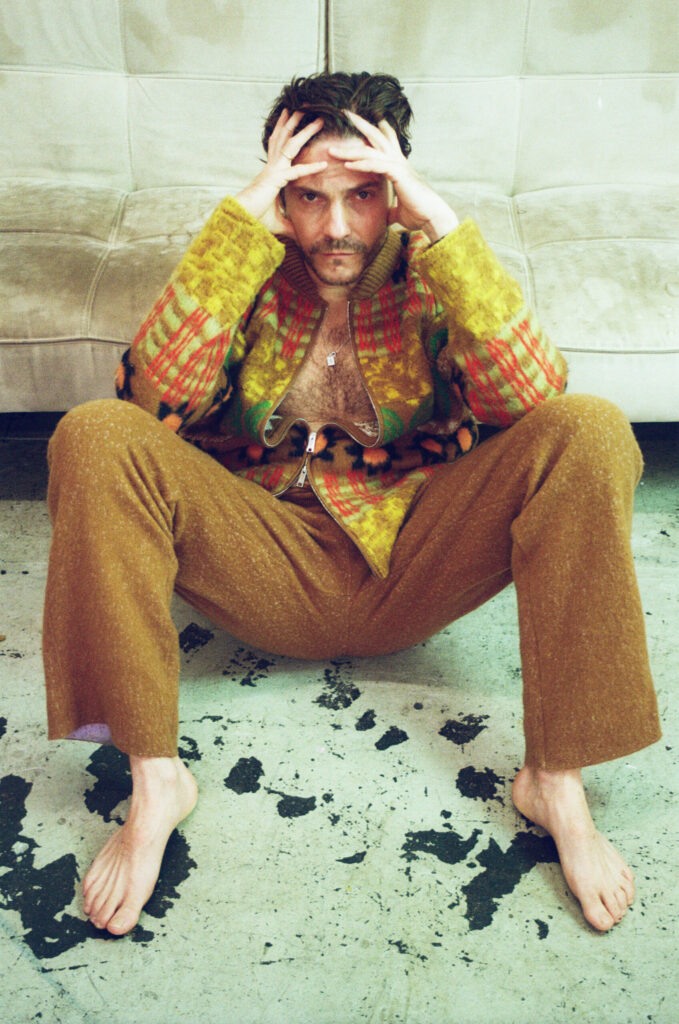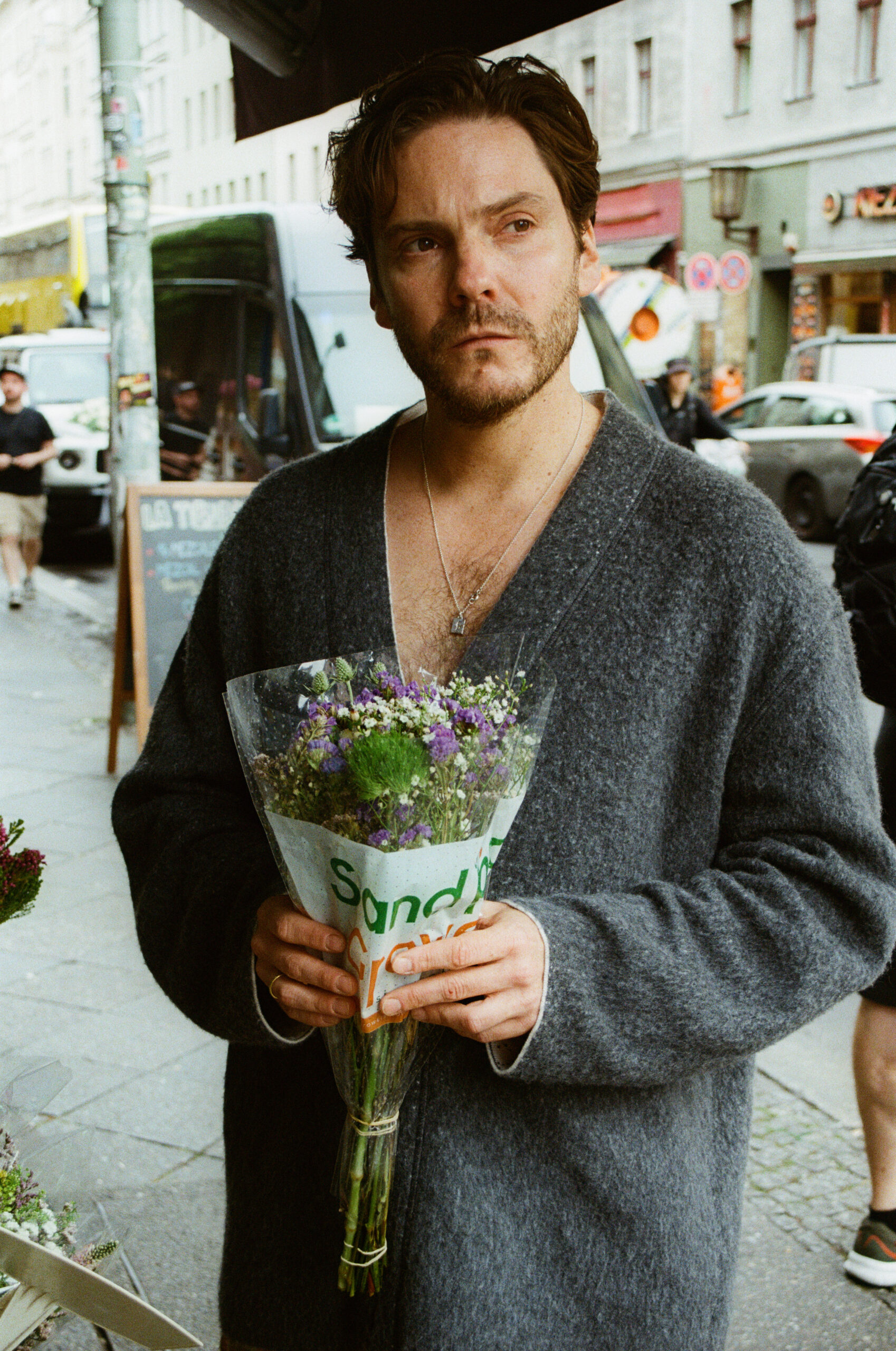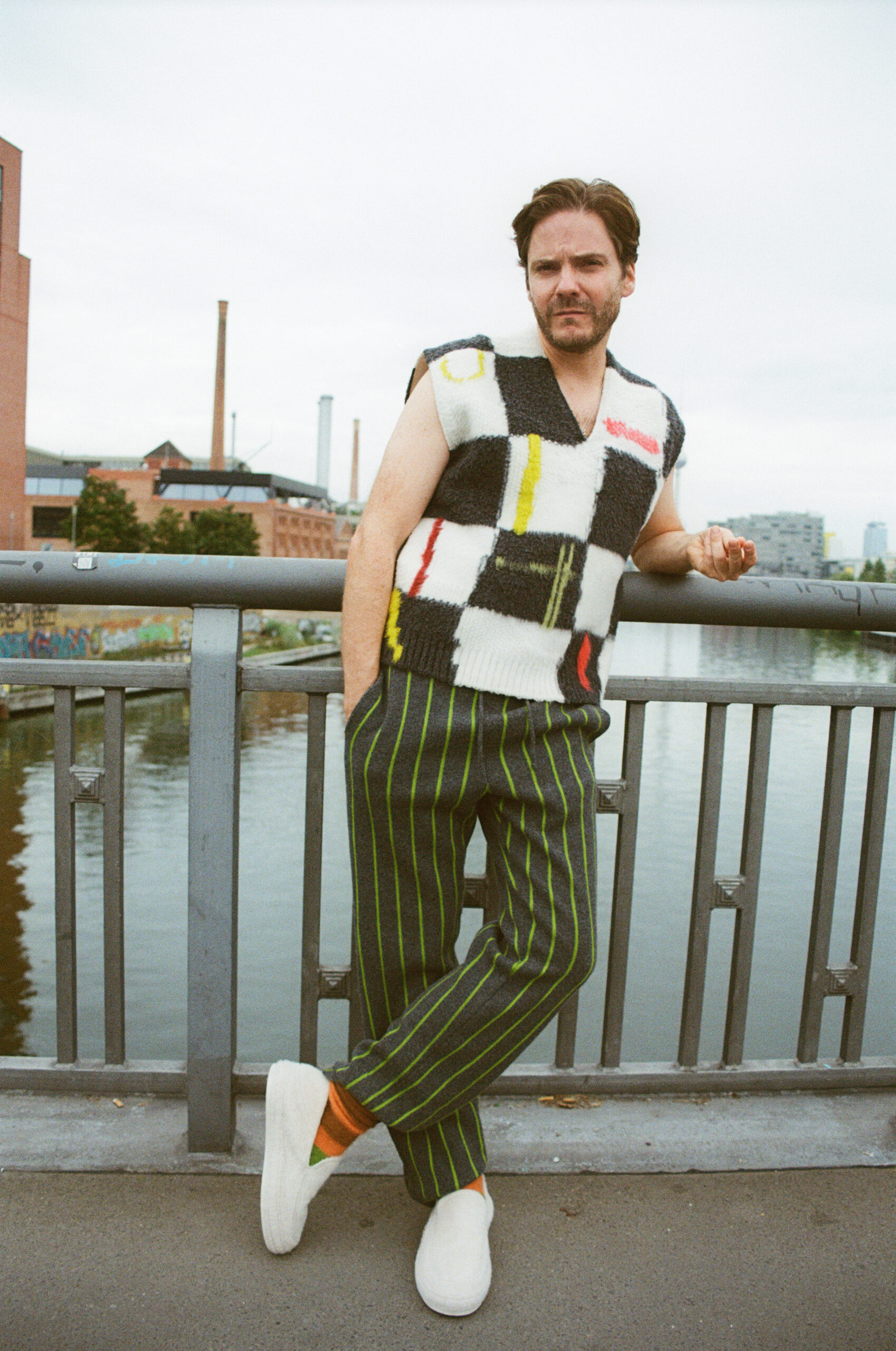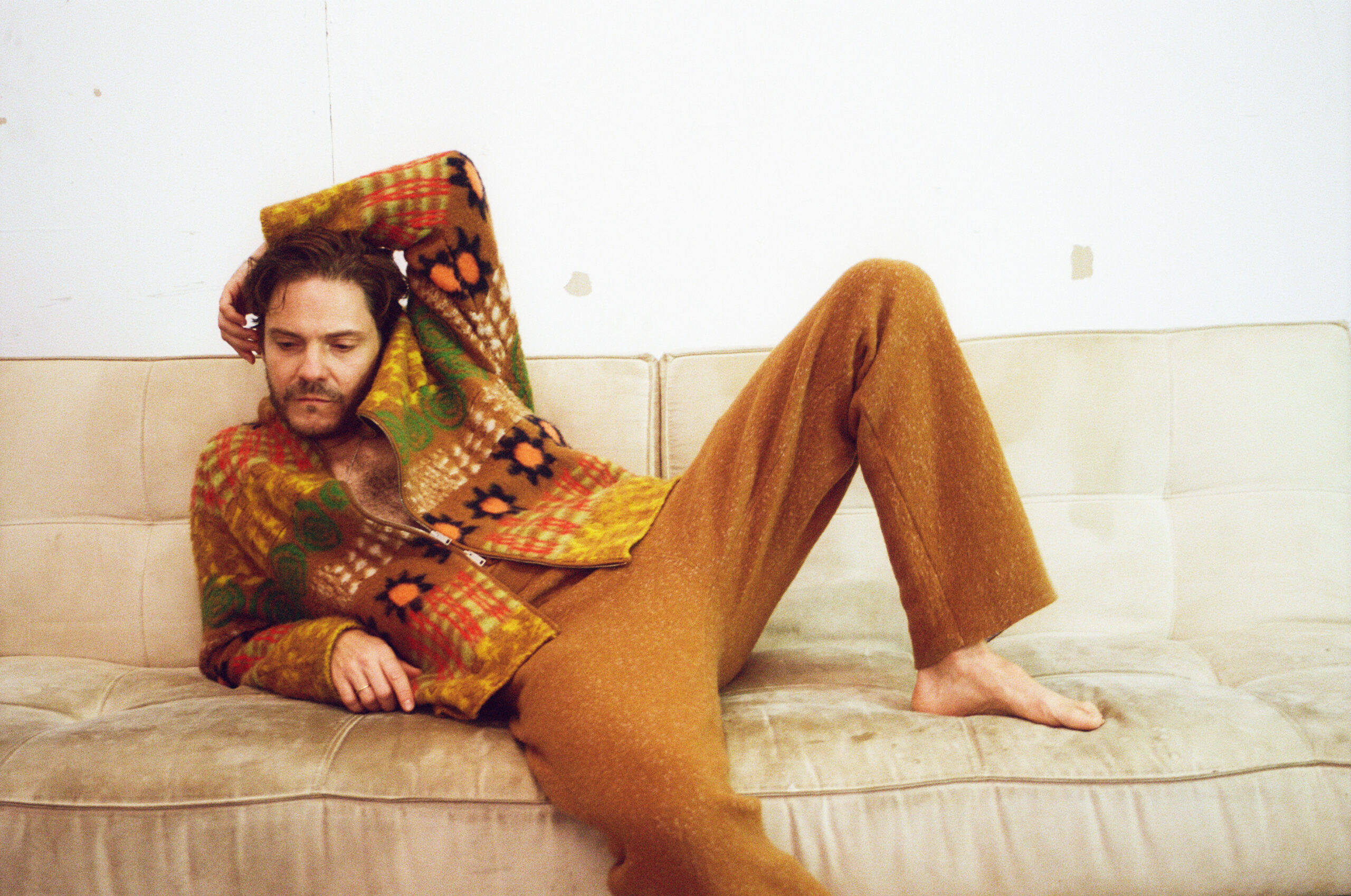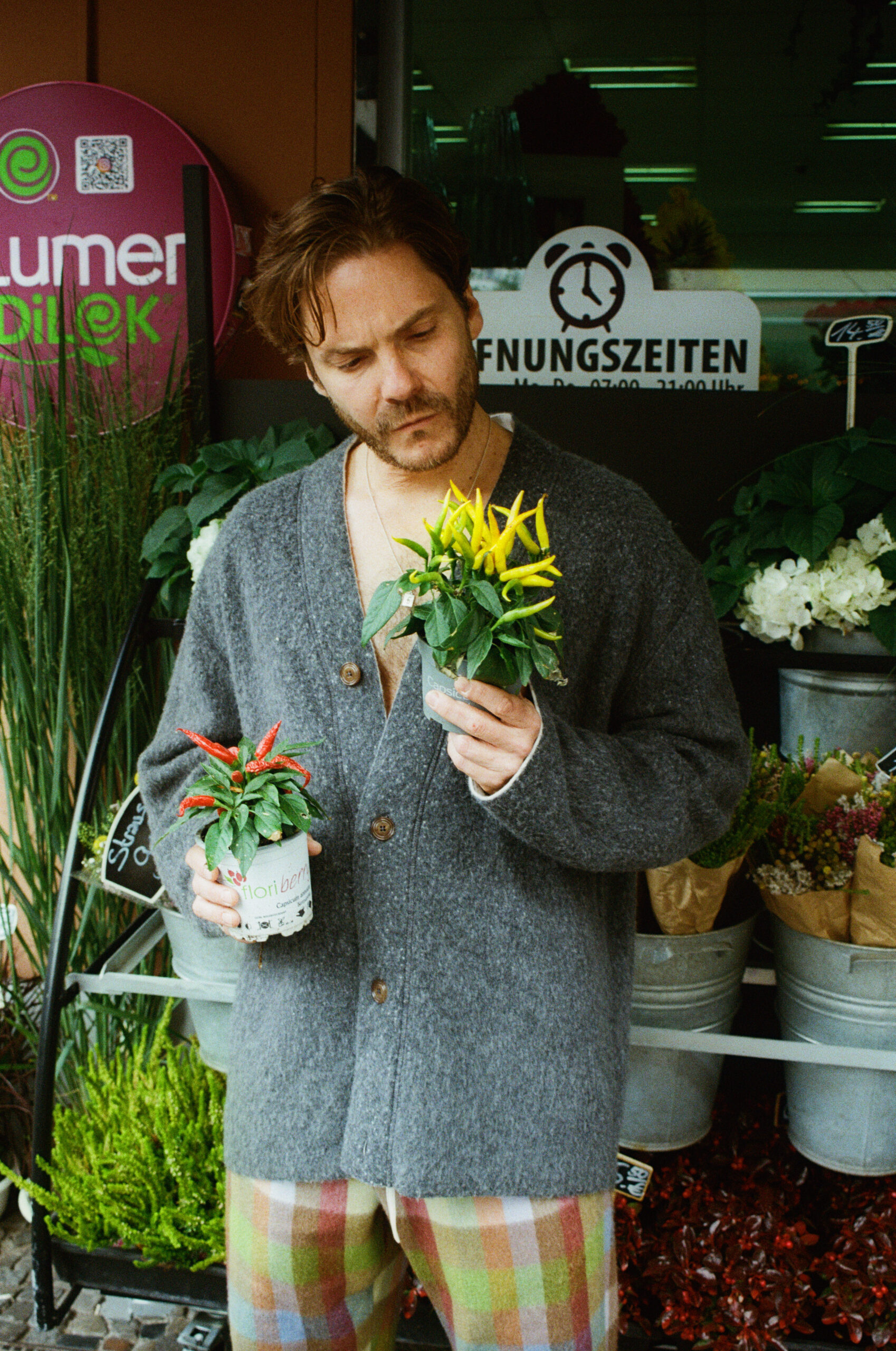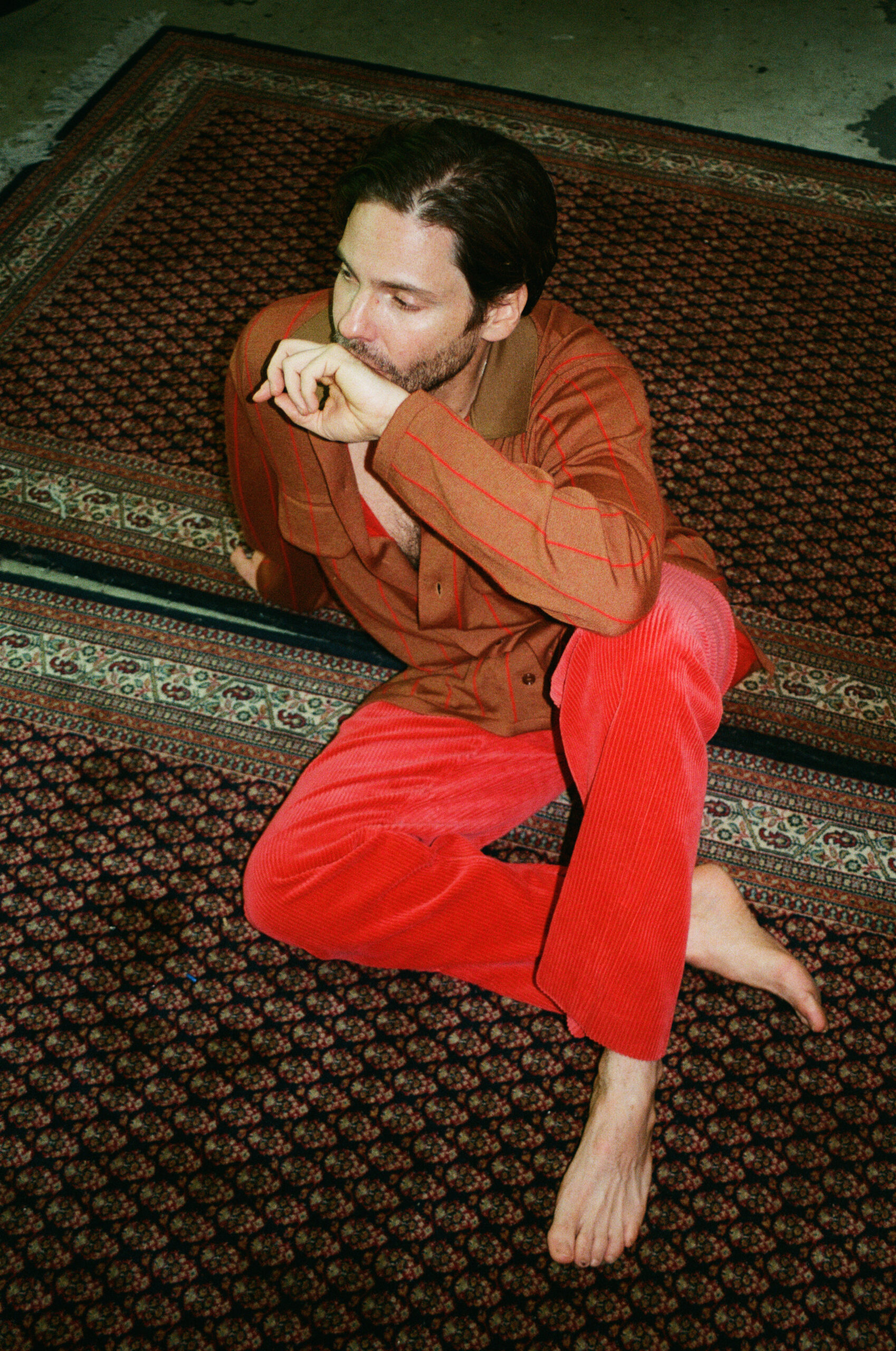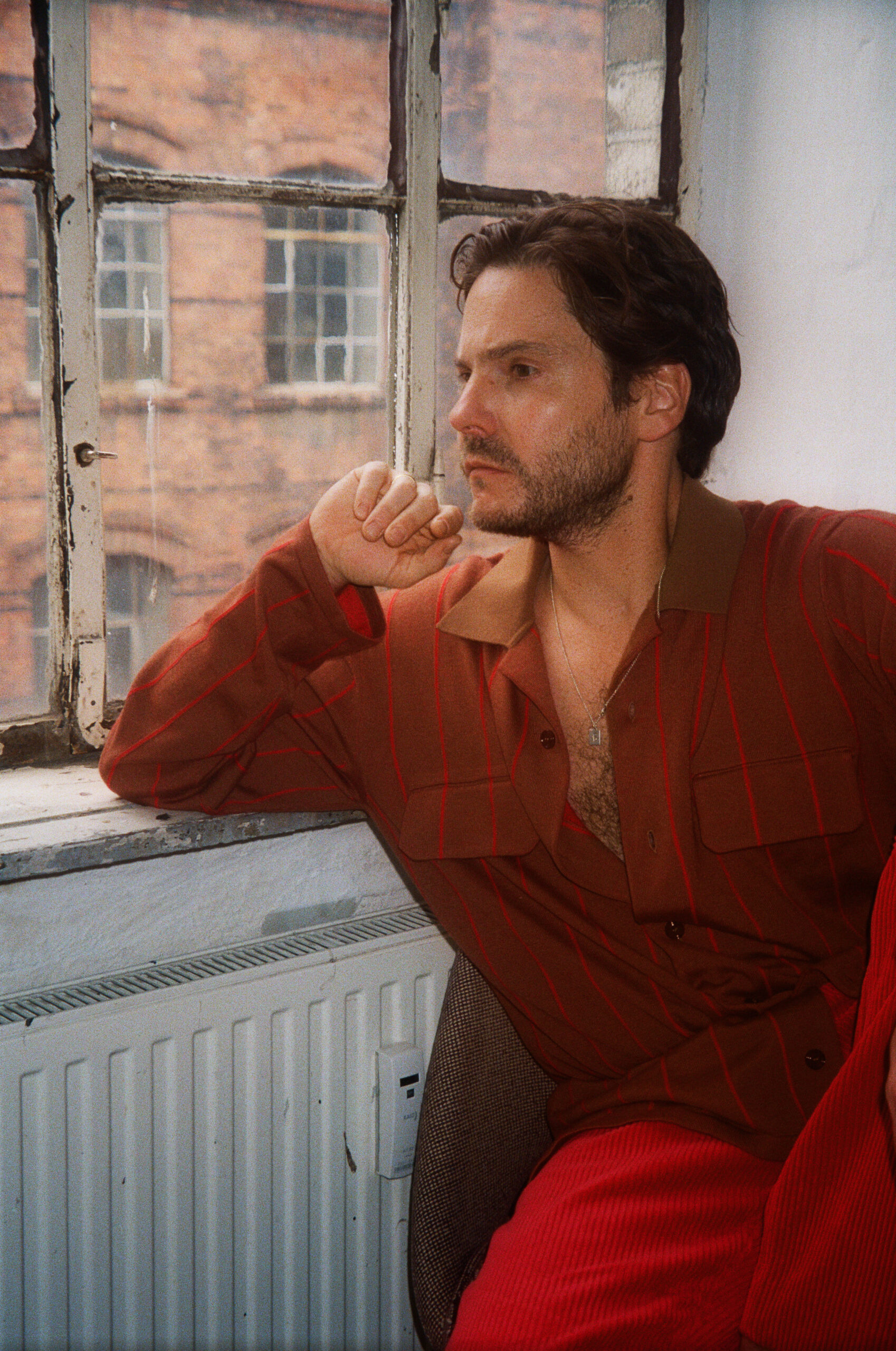“Which Karl are you playing? Because at different times, he seemed almost like a different person, right?” Vicky Krieps asks her friend Daniel Brühl, who earlier this year transformed himself into the great Karl Lagerfeld for the forthcoming Disney+ series Kaiser Karl. Krieps, who recounted for Brühl her own brief but impactful encounter with the designer at a fashion show a few years back, got on Zoom earlier this month to interview her handsome countryman, best known for his roles in films like All Quiet on the Western Front and Rush.
Brühl prepared for the role by scouting the very same Paris streets where Lagerfeld once rubbed elbows with Yves Saint Laurent, “nourishing” himself with Lagerfeld’s diverse interests before landing on his very own “Karlito,” as Bruhl affectionately calls him. “He’s a bit like Andy Warhol,” Brühl explained. “On the one hand, this person is in the limelight, in constant exposure to the world, but [they were both] actually very lonely, lonesome men, shielding themselves and creating that persona.” Both of them fresh off recent trips to Berlin, Brühl and Krieps unpacked their relationships to home, upcoming projects, and Krieps’ new gig as a Subway performer. Then, Brühl got dressed up in the finest of knitwear from ZEGNA’s exclusive partnership with The Elder Statesman to go flower shopping with photographer Spyros Rennt.
———
VICKY KRIEPS: Hello, Daniel. First question, are we doing this in English?
DANIEL BRUHL: I guess we have to. You know, I was very sad that I couldn’t come to your concert in Berlin, because the pictures and the videos looked so cool. And I was thinking, “You’re doing that?”
KRIEPS: But it’s very spontaneous.
BRUHL: Was it spontaneous?
KRIEPS: You know me, Daniel. I don’t plan anything, really. I’m an actor, and over the past 10 years I had to find a way to process my character and let it go when I wrap. I find there’s not many techniques or much help. It’s all about getting into the character, to get the audition, the role, but you almost find nothing about getting out of character. Because I had children very early, that was a big thing for me. So I bought a cheap guitar and I started writing songs for my characters. I accumulated all these songs and people were telling me, “Vicky, you have to do this.” Now I’ve found people I really trust, so we recorded. Then I was like, “Where can we just play a free concert?” And that’s how we landed in the subway station.
BRUHL: Underground? That’s great.
KRIEPS: Yeah.
BRUHL: It’s always fun when you realize your music tastes didn’t change that much. Did your music taste change?
KRIEPS: Over the years?
BRUHL: Yeah.
KRIEPS: Not really. But my parents were very guilty of my music taste. My first CD was Jimi Hendrix
BRUHL: That’s a great first CD. I need to come back to the house where you grew up in Luxembourg. If you meet someone and you see that person in a place where they grew up, then you understand a lot [about them]. So, when I saw your mother and I saw that house, I thought, “Of course, it all makes sense.”
KRIEPS: It’s what everyone says when they enter that house.
BRUHL: I was so warmly welcomed. I remember some cats.
KRIEPS: Yes, two cats. Two baby cats that I took with me after a movie I did, The Chambermaid Lynn. They were used just for one shot and then, in the end, they were like, “Oh, the poor cats. Now they go to the kennel.” So I just took them with me.
BRUHL: I don’t know what your favorite animal is.
KRIEPS: I love elephants, I think. Was that the right answer? Do I get a point now?
BRUHL: Is it an African elephant or the Indian elephants?
KRIEPS: African.
BRUHL: African? Very good.
KRIEPS: I keep getting in trouble because, in interviews, you’re also supposed to follow this certain routine. And I never do what they tell me to do, ever. But somehow I’m here, and I’m also part of this thing, which is so funny.
BRUHL: Interview Magazine can now blame you and not me.
KRIEPS: Exactly. They absolutely can. But also, I have to thank them, because I don’t feel like someone told me what to do.
BRUHL: Where is home at the moment for you? Is it still Berlin?
KRIEPS: Yeah, I think. I maybe wouldn’t choose Berlin, but you don’t always choose in life. So now it’s Berlin. The kids are here, they’re in school, and I think I’m happy. Except that I miss good food and different kinds of cultures.
BRUHL: Yeah, yeah, yeah. It’s funny how it goes, because it used to be our home for 22 years. I think I moved there in 2001, and I went back recently. Berlin is this city that’s still cool when you’re a bit younger than me. I had the impression that I’d kind of done and seen it all and I just needed a move. But I feel that I have to fall in love [with it] again, which might happen after a couple of years.
KRIEPS: I’m always over Berlin, and then suddenly it hits me again. Berlin is like a wild beast, I think. It’s ever-changing.
BRUHL: It’s never been that established beauty, like Paris or London or Rome. When I came back, I was asked for recommendations for restaurants, and I was out of the game. Even in my sleepy little neighborhood, there were new restaurants that I never heard of, and some of them very good ones. And I just realized how quickly it evolves and changes.
KRIEPS: Completely. So what are you doing now? You’re going to Australia for work?
BRUHL: Yeah. I’ve never been. It’s in Queensland, and I think the place is called Golden Coast or something like that.
KRIEPS: Oh yes, I know it, because I did a movie in New Zealand earlier this year. What are you shooting there? Can you say?
BRUHL: Yeah, yeah. I’m working with Ron Howard again. 10 years ago, when we worked on a film [Rush], he told me about a project which was actually set in the 1930s on the Galapagos Islands. If you Google it, “Floreana Galapagos Islands,” you will see the real people. These Germans were traumatized after the first World War and the economic crisis and the total despair about civilization. They wanted to flee civilization and start a new utopia, a new life, and build their own paradise in the Galapagos Islands, which is not the typical coconut, sunset kind of vibe. It’s really harsh nature. They were very modern-thinking people, like hippies way before there were hippies. It’s a tale about how paradise is lost as soon as other people get into the game, [because] humanity is not able to share, perhaps. So, it ended in a quite gruesome way, and this is the story. And funny enough, different directors wanted to do it. But Ron is doing it now, with Jude Law, Ana de Armas, Vanessa Kirby and Sydney Sweeney. But there’s also one friend of mine who’s in it, but I don’t know if I can say who it is. You know him.
KRIEPS: Oh, yes. And something else is coming out soon, right? The series about Karl Lagerfeld?
BRUHL: Well, I just did some ADR, but I think it’s going to come out next year, in April or so.
KRIEPS: How was that? Which Karl are you playing?
BRUHL: My own Karlito. I had a lot of fun with that part because he was such a curious, wholly faceted man who was interested in everything. So the preparation was so much fun, just nourishing myself with everything. He loved literature, cinema, theater, music, architecture, furniture, fucking everything. So when I was in Paris, I managed to stay in the same neighborhoods that he used to love. And they always have these great classic cinemas, like Champo, and he used to hang out there with Yves Saint Laurent and all the other guys in the Boulevard Saint Germain, which has become, of course, very touristy here. But there’s still some little hidden corners that I liked to hang out in and walk around. You have to make some choices, because there’s so many contradictions that made up part of his past.
KRIEPS: At different times, he seemed almost like a different person, right?
BRUHL: Yeah, yeah. I just made choices from all the biographies I read and all the stories that I heard from people who knew him. He’s a bit like Andy Warhol. On the one hand, this person is in the limelight, in constant exposure to the world, but [they were both] actually very lonely, lonesome men, shielding themselves and creating that persona. So I had to find out for myself what he was doing when he was alone, on his own at home. That’s the fun part.
KRIEPS: You know that I met him in real life?
BRUHL: Oh. When?
KRIEPS: Yeah. I met him at the end of his life, because I did Phantom Thread. And when you do movies like this, they come with the fashion shows. And you know me, I was like, “What? I’m not doing this. I’m not going to go somewhere and have my picture taken again by a village.” But I received a letter from him. And he said–
BRUHL: Come on!
KRIEPS: He said, “I don’t watch movies anymore, but Anna Wintour gave me a DVD and so I watched it. Please come to my show.” And then I thought, “Oh, I have to go.” And he was very serious. He took my hand and he was super dead-serious, which was actually helpful. Because in that period of my life, suddenly all these people popped up like, “You’re so amazing. Oh my god, I love you.” You know? And he was the only person who was not smiling at all. He was very serious. He looked more like someone had died. And he took my hand and said, “You know, you did something really good. Now you have to continue.” But it felt like he’s telling me, “Now you’re fucked for life,” you know? “Now you’re in it. You cannot get out once you’ve done something like that.”
BRUHL: Yeah. Well, I think he would’ve approved of every single step that you’ve taken since your meeting. When will we run into each other? Where are you going to celebrate Christmas?
KRIEPS: I think Christmas in Berlin because it’s been so complicated to go to Luxembourg. On New Year’s I will be in New York, because I’m going to a Patti Smith concert, which is also on her 77th birthday. She invited me, so I want to go.
BRUHL: Oh, great. Look at you! Next, you’ve got to play with Patty Smith underground in New York.
KRIEPS: Yeah, exactly!
BRUHL: Then, I will come.
KRIEPS: Then you have to come.
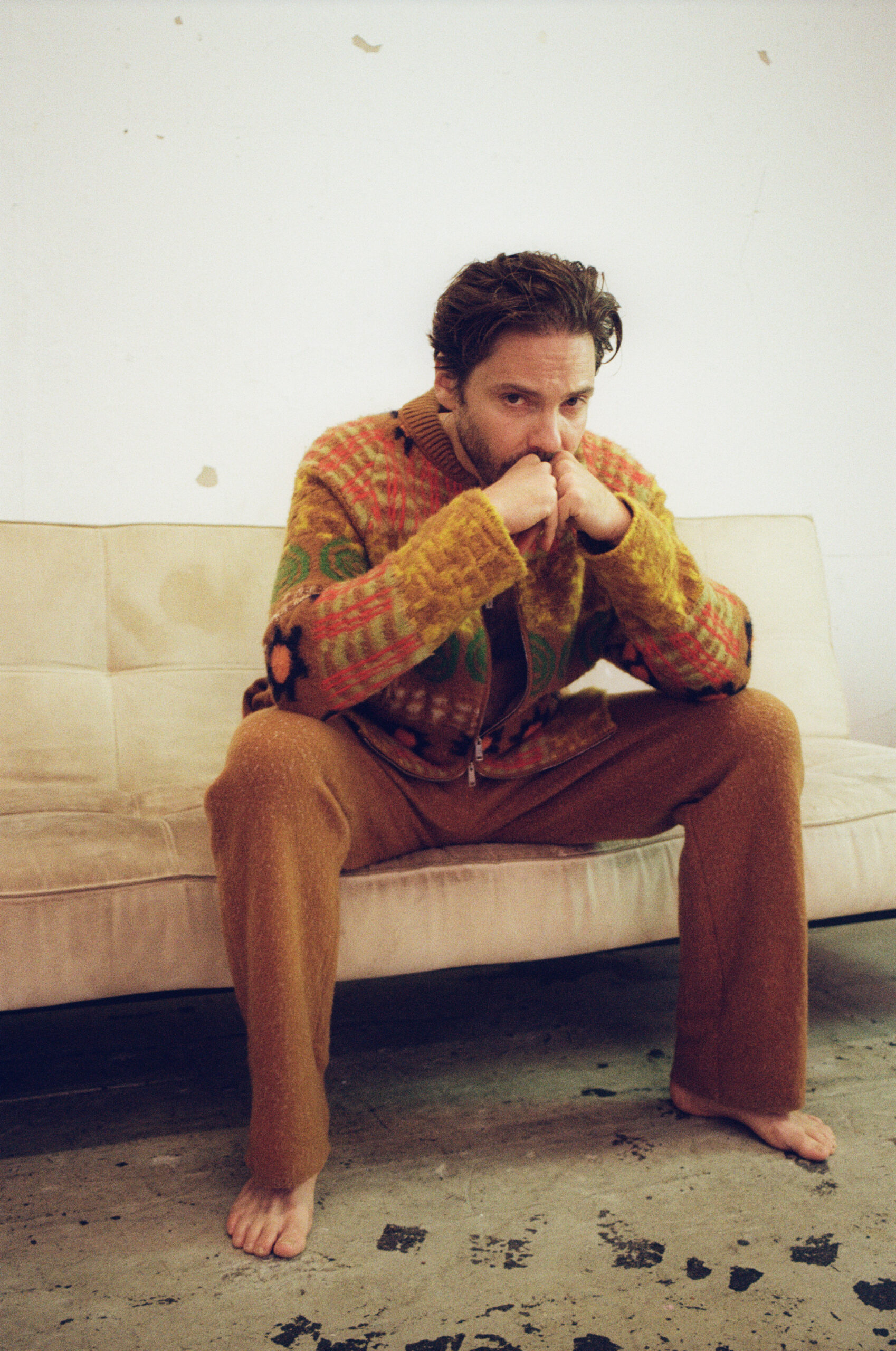
Jacket and Pants by ZEGNA X The Elder Statesmann. Necklace (worn throughout) and Ring (worn throughout) Daniel’s Own.
———
Grooming: Janina Zais using Schwarzkopf Professional

